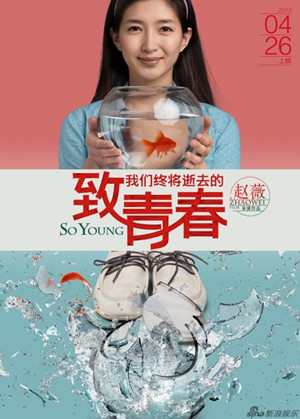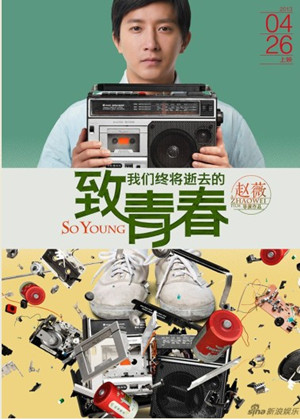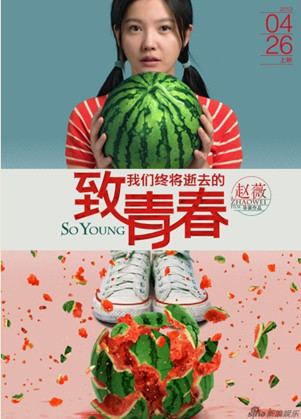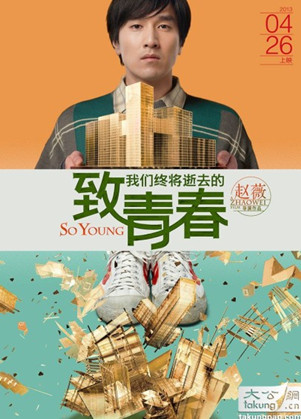Released at the same time
The film So Young had strong growth stamina: it grossed 200 million yuan within 4 days, 300 million yuan within 6 days, and 600 million yuan within 16 days. Naturally businessmen began sniffing for big new markets based on these numbers.
The book fever aroused by the film’s success is one example. On May 1st, with attractive advertisements such as “Zhao Wei’s Directorial Debut” “Film Commemorative Edition” and “Xin Yiwu’s classic work,” the novel So Young, which was written by Xin Yiwu, was published by Baihuazhou Literature and Art Publishing House. At the same time, with the same name, the film’s scriptwriter Li Qiang’s script work was published by Beijing Lianhe Publishing House with the title “A New So Young.”



Based on China IP’s research, the two books mentioned above appeared on China’s three major online book stores and had reached over ten thousands of comments in total. Though the sales of the two books remain unknown, they have greatly stimulated the sluggish paper book market.
The overwhelming success of the film can be attributed to the execution of a great business operation: the producer made a smart investment; Zhao Wei has become one of the elite directors with over 500 million yuan in box office sales in her directorial debut; Xin Yiwu’s novel is likely to be an enduring best seller, and the scriptwriter Li Qiang has also published a collection of works based on the film script.
In the face of such big success, however, there is one report saying that Li Qiang and Beijing Lianhe Publishing House did not get Xin Yiwu’s permission to publish the adaptation work.
A China IP’s journalist contacted Xin Yiwu’s agent Mr. Li for more information. Mr. Li told China IP that Ms. Xin only gave authorization of adaptation right, but there was no specific regulation on “whether the adaptation work can be published” in the contract.
There is no litigation or arbitration action about this potential dispute as of the publication of this article. Therefore, this article will discuss the similar phenomena from a broader perspective rather than focus on the So Young dispute itself only.
Many novels have been adapted into movies or TV series in recent years. Because the adaptation involves many different right subjects, including the author, producer, scriptwriter and publishing house etc., various disputes tend to occur.
As for such disputes, Dai Riqiang, chief editor of the Readnovel website and also know as a young writer and scriptwriter, told China IP of his own understanding. He has had plenty of practical experience signing contracts with authors and dealing with adaptation related issues.
“In a broad sense, any good novel (good story or good idea) is fit to be adapted into a movie or TV series; while in a narrow sense, any novel which can reflect China’s national situation can be adapted into a movie or TV series in China. As far as I have experienced, the authors always cooperate closely and actively. Of course there are some minor problems, but most of the time these involve different understandings held by two parties on the details of the regulations.” Mr. Dai told China IP.
He used a metaphor to describe novel and the adapted movie or TV series. He referred the author of the novel as the “natural mother” and the scriptwriter of the adaptation work as the “stepmother.” The rights can be divided as follows: the author enjoys the copyright of the novel, while the scriptwriter enjoys the copyright of the adaptation work. Beyond that, specific situations will require contractual provisions.
Admittedly, it is a good business model to make a novel into a movie or TV series, however it can be problematic. If the line between the rights over the subject matter and the boundaries between rights remains unclear, the divergent interests are bound to create continuing disputes.

The importance of dual authorization
China IP interviewed Li Jingjian, a lawyer at Beijing Yingke Law Firm, for more information about the So Young dispute. He said that the core of the issue lies in the nature of the adaptation work’s copyright and its boundary when excising the copyright; to be more specific, it also includes the obligation of the work done by the author and publisher of the adaptation work.
According to Article 12 of the Copyright Law, “Where a work is created by adaptation, translation, annotation or arrangement of a preexisting work, the copyright in the work thus created shall be enjoyed by the adapter, translator, annotator or arranger, provided that the exercise of such copyright shall not prejudice the copyright in the original work.” Article 35 of the Copyright Law stipulates that “when publishing works created by adaptation, translation, annotation, arrangement or compilation of preexisting works, the publisher shall both have the permission from, and pay remuneration to, the owners of the copyright in the works created by means of adaptation, translation, annotation, arrangement or compilation and the owners of the copyright in the original works.”
Li Jingjian analyzed the So Young copyright dispute from two perspectives: the legal and contractual obligations.
From the legal obligation perspective, the scriptwriter Li Qiang is the subject of the right of “adaptation work of a preexisting work,” and owns the copyright to the adaptation work, i.e. the copyright of the script. But he cannot use that copyright to infringe on the copyright of the original work, i.e. the copyright of Xin Yiwu’s original So Young novel. Moreover the publishing house of the script work is the subject responsible for “publishing the adaptation work,” and must get permission from both the novel author and the scriptwriter before publishing the script work. Therefore, the legal obligation for the scriptwriter is that when exercising the adaptation work’s copyright, he may not infringe on the novel author’s copyright, and also bears a certain extent of notice liability. As for the publishing house, its legal obligation is to get authorization from both the novel author and the scriptwriter before publishing the script work. The publishing house bears the legal risks if it fails to get dual authorization, which means obtain authorization from both the scriptwriter and the author of the novel before publishing the adaptation work. Publishing without proper authorization violates Article 35 of the Copyright Law, and constitutes copyright infringement and exposes the publishing house to liability.
At the same time, if the scriptwriter fails to fulfill the notice obligation and infringes on the novel author’s copyright during the adaptation work authorization process, he is liable for the infringement in accordance with Article 12 of the Copyright Law.
From the contractual obligation perspective, it is necessary to identify whether there is an agreement to specify the script work publication issue in the contract signed between the novel author and the producer. Without a contract, there is a legal assumption that the novel author did not authorize the producer to publish the script work. According to Article 26 of the Copyright Law, which provides that “The other party shall not, without permission from the copyright owner, exercise any right that the copyright owner has not expressly licensed or assigned in the licensing and assignment contract.” However, since the contract only involves the novel author and the producer, the novel author cannot pursue the liability for breach of contract from the producer if it doesn’t excise publication right or give authorization to the other parties to publish the adaptation work.
Furthermore, the scriptwriter should read all agreements carefully to determine the rights held by the producer. This is especially true regarding agreements on the property right of the copyright of the script as well as on the publication right of the adaptation work. If, according to the agreement, the producer is legally given the publication right of the adaptation work or the property right of the script as a whole, the scriptwriter violates the agreement it has with the producer if it authorizes the publishing house to publish the adaptation work without the consent of the producer.
According to Li Jingjian, in order to identify rights and obligations of the related parties, and to judge whether infringements and breach of agreement exist, it is essential to make three critical determinations: 1) whether the publishing house has obtained dual authorization; 2) whether the right holder of the adaptation work has fulfilled the notice obligation during the adaptation process; and 3) whether all parties have a clear understanding of the legal rights and relationships of the right holders, the interested parties and the agreements among them.
Instructive precedents
In today’s current business environment, movies or TV series that perform well at box office consistently find themselves involved in legal disputes. There is precedent in this area.
In 2010 the copyright infringement case between the novel author Ye Zhaoyan and scriptwriter Chen Tong over the book Ma Wen’s War reached a final judgment in Nanjing Intermediate People’s Court. The court held that Chen Tong and Peking University Press had infringed on Ye Zhaoyan’s name and adaptation rights, and they were ordered to pay Ye Zhaoyan 332,000 yuan in compensation. This case was selected as one of the Model IP cases of Jiangsu Province in 2012.
In the Ma Wen’s War case, the court held that Ye Zhaoyan owned the copyright of the novella Ma Wen’s War. Another edition of Ma Wen’s War, written by Chen Tong, was found to be an adaptation work of the original novella. Chen Tong was entitled to rewrite the novella into a script based on the scriptwriting contract; however, according to restrictions provided in the Copyright Licensing Contract, Chen Tong had no right to publish his own edition of the novella. In addition, Peking University Press did not get authorization from neither the author of the original novella nor the scriptwriter to publish the adaptation work. As a result, both Chen Tong and Peking University Press infringed on Ye Zhaoyan’s copyright. The court also found that the book seller, Xian Feng Book Store, had also constituted infringement of Ye Zhaoyan’s copyright by selling Chen Tong’s edition of Ma Wen’s War. According to the Copyright Law and Interpretation of the Supreme People’s Court Concerning the Application of Laws in the Trial of Cases of Civil Disputes Arising from Copyright, Chen Tong, Beijing University Press and Xian Feng Book Store were ordered to immediately stop infringing the copyright owned by Ye Zhaoyan on the novella Ma Wen’s War.
The copyright disputes on adaptation work spring up thick and fast, and copyright attribution and excising of adaptation work are common problems in the IP industry. The judgment of this case has caused heated discussions and debates.
Li Jingjian gives suggestions from the perspective of the industry standard: firstly, when a publishing house decides to publish an adaptation work, it should get authorization from both the author of the original work and the writer of the adaptation work; secondly, the licensing contracts and contracts which stipulate the adaptation right must specifically and clearly state the usage method of the adaptation work, and should also define a clear and orderly copyright relationship; thirdly, in excising the copyright of the adaptation work, to avoid copyright infringement of the original work, every party should know its own obligations, get corresponding authorizations, and fulfill all notice obligations.
In the scope of the Copyright Law, practitioners in cultural and creative industries need to comprehensively layout an IP strategy for their work. Through negotiations and agreements, all parties’ rights and interests can be defined more clearly. Taking a methodical and careful approach is favorable not only for the interests of the practitioners, but also for the healthy development of the entire industry.
(Translated by Emily Tan)




